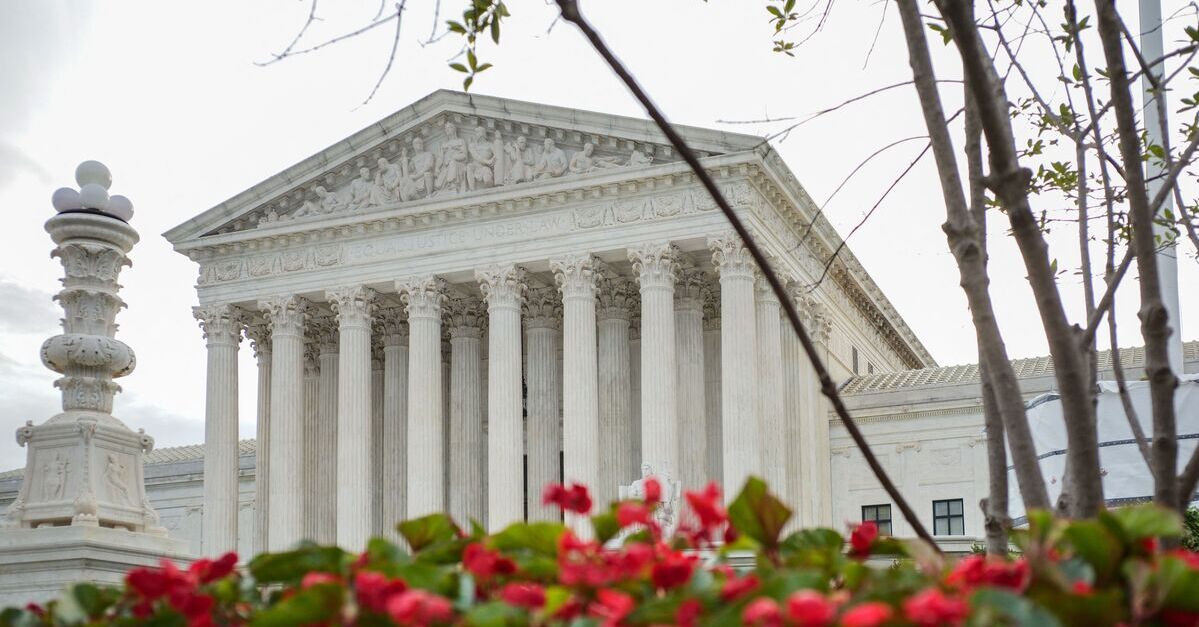
The U.S. Supreme Court is seen in Washington, D.C. on Oct. 4, 2021.
The U.S. Supreme Court declined late on Monday to block state court-ordered congressional maps in Pennsylvania and North Carolina before the 2022 primary and general elections, in two orders late on Monday. Three members of the high court’s right flank would have granted the application, and two other conservatives would have entertained it had the maneuver not fallen months before an election.
Late last month, North Carolina’s highest court invalidated a GOP-drawn map of the state’s 14 congressional districts as unconstitutionally partisan and substituted its own. Separately, the Supreme Court of Pennsylvania adopted a proposal favored by the state’s Gov. Tom Wolf (D), who vetoed a map stamped by the Republican-dominated Legislature. The alternative proposal, known as the “Carter plan,” favored Democrats and received the blessing of the state’s high courts.
Both state supreme court rulings were appealed to the U.S. Supreme Court, where petitioners backing the GOP plan argued that the U.S. Constitution empowers state Legislatures to choose the “times, places and manner of holding elections.”
Attorney Joshua Matz, from the Washington, D.C. firm Kaplan Hecker & Fink, opposed the petition for an emergency injunction, arguing that such a move would insert the Supreme Court in a state elections in a way unseen in centuries.
“This Court has affirmed time and again—most recently in a case arising from Alabama—that it is loathe to upend state election processes late in the day,” Matz wrote in opposition to the requested injunction last week. “Here, with nomination petitions already in circulation, Petitioners ask the Court to scrap the entire congressional map for Pennsylvania and to order the Commonwealth to hold statewide at-large congressional elections for the first time since the 18th century.”
Three justices on the court’s right flank appeared poised to take that action, in noted dissents by Justices Samuel Alito, Clarence Thomas and Neil Gorsuch.
“This case presents an exceptionally important and recurring question of constitutional law, namely, the extent of a state court’s authority to reject rules adopted by a state legislature for use in conducting federal elections,” Alito wrote, in a dissent joined by the other two justices. “There can be no doubt that this question is of great national importance. But we have not yet found an opportune occasion to address the issue.”
Chief Justice John Roberts and Justice Brett Kavanaugh, though unwilling to go so far as to block the maps, appeared to agree with their fellow conservatives on the importance of the questions.
“I agree with Justice Alito that the underlying Elections Clause question raised in the emergency application is important, and that both sides have advanced serious arguments on the merits,” they wrote. “The issue is almost certain to keep arising until the Court definitively resolves it. Therefore, if the Court receives petitions for certiorari raising the issue, I believe that the Court should grant certiorari in an appropriate case—either in this case from North Carolina or in a similar case from another State. If the Court does so, the Court can carefully consider and decide the issue next Term after full briefing and oral argument.”
Roberts and Kavanaugh, however, quarreled with the “extraordinary interim relief” requested and the timing that would upend the districts for the upcoming 2022 primary and general elections.
“But this Court has repeatedly ruled that federal courts ordinarily should not alter state election laws in the period close to an election,” they wrote, citing the so-called “Purcell principle.”
Neither of the parties immediately responded to emails requesting comment.
This is a developing story.